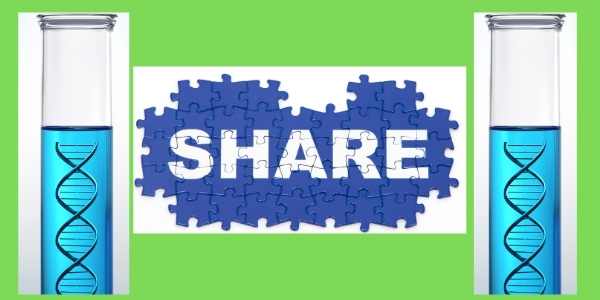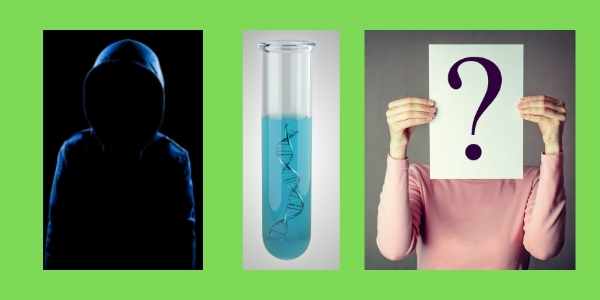Ancestry.com and 23andMe are separate companies that mostly do not share data with each other.
But there are some exceptions, and this article explains how this does or does not affect you.
Some customers would prefer that their DNA be shared across both companies. This would avoid having to buy two DNA tests. If that’s what you want, we’ll point you towards some workaround.
Would you rather that your information is restricted to one company? We’ll explain what you shouldn’t do with your DNA results.
Do 23andMe And Ancestry Share Information With Each Other?

23andMe and Ancestry.com are rival companies competing for customers. Like other commercial companies, they guard their data from competitors. Their DNA databases are completely separate.
However, there are two ways that they share data:
- their own research publications
- participation in 3rd party research projects
I’ll look at both of these in turn to see how they affect you.
Both companies publish some data
However, both companies publish academic white papers that include broad statistics on ethnicity and DNA profiles.
Your own DNA test cannot be identified from these studies.
Both companies share data with research projects

23andMe is more active than Ancestry.com in sharing data for research into hereditary diseases and cures.
You can read about this in our article on whether 23andMe sells your DNA data. One example is the Michael J Fox Foundation for research into Parkinson’s Disease.
Ancestry has also collaborated with other organizations on projects like the National Marrow Donor Program. You can read more in our article on whether Ancestry sells DNA data.
So, it’s possible that both companies could work with the same outside organization. In that way, they would be sharing customer DNA data.
But it’s important to understand that the data is anonymized. All personal details are removed and the data is pooled into a summarized form.
This means that if you tested with Ancestry.com, then 23andMe couldn’t identify you from this type of shared data. And vice versa.
Do 23andMe And Ancestry Share Databases?
Both companies keep their own independent databases of customer data. If you are browsing your list of DNA relatives on either website, you are seeing data from the company database.
But do they share these databases? No, they don’t. This could only happen through a merger or if one company bought the other.
That would be very unlikely for companies of their size.
If you’re interested, we’ve got a separate article that tracks the size of the DNA databases. Ancestry is still the largest, with 23andMe in second place.
I Want To Share My 23andMe DNA With Ancestry. How Do I Do That?

There was a brief time when 23andMe accepted uploads of Ancestry DNA results. You may see out-dated references to this online.
But currently, neither company accepts DNA tests from their rivals.
However, there’s a workaround that will allow you to research hundreds of DNA relatives that tested with the other site.
Here are two tutorials that take you through the process (depending on who you tested with):
If you tested with both companies, we have lots of tips on ways to find your 23andMe relatives on Ancestry (and vice versa).
How Do I Share My Ancestry Tree On 23andMe?
Do you have a family tree on Ancestry.com but you DNA tested with 23andMe?
You’ve probably noticed that the 23andMe genetic trees are of limited use for family research.
Check out our guide on how to link 23andMe to Ancestry. This will show you how to hook your Ancestry tree up to your 23andMe account.
How To Avoid Being “Found” By Customers From Other DNA Testing Companies

So far, I’ve given you tutorials that are aimed at using one DNA test to find DNA relatives on other company websites. This avoids having to buy multiple DNA tests.
But what if you tested with Ancestry.com and you don’t want a relative on 23andMe to “find” you through DNA matching? Or vice versa?
The main answer is to avoid transferring your DNA results to websites like MyHeritage, FamilyTreeDNA, and GEDmatch. These sites take free uploads of DNA from both Ancestry and 23andMe.
This is completely under control. Just don’t do the transfer. And if you did and regret it, log into those sites and delete your DNA.
Do Other DNA Testing Companies Share Data?
Hopefully, this article has allayed any concerns you had about Ancestry and 23andMe sharing information.
But what about other DNA testing companies? Do you need to worry about whether Ancestry or 23andMe is sharing data with MyHeritage or FamilyTreeDNA?
Frankly, this would be against their business interests. But apart from that, your DNA data is protected under the privacy legislation of your country.
The only time that it’s likely to happen is in the event of a merger or acquisition.
We actually do have one example of that, but not involving the big two DNA companies.
When MyHeritage (a smaller DNA testing company) purchased Promethease (a health testing company), they merged the databases.
This was after a period when customers could opt-out by removing their DNA.
It’s worth noting that this exposed some major differences in customer privacy and protection between the United States and Europe. It turned into a mess for American customers.
If you want to read more, check out our article on who owns Promeathease.
Are Ancestry And 23andMe The Same Company?
Because their advertising can be similar, some people aren’t sure whether Ancestry and 23andMe are the same company or not.
The answer is no, they have never been connected with each other.
You can read about their ownership in these articles:
If the companies do not share a common database, it raises the question of accuracy in DNA ancestry testing results, i.e., if two siblings have been tested, (1) by company A and (2) by company B (company A & B do not share data) then it would not be an accurate test for ancestry.
The above shows an inaccurate ancestry result due to lack of matching data between companies A & B. Of course the same results would result from any other companies who did not share data.
Another example of DNA inaccuracy in testing, is if one, or more, participants who do share data, voluntarily opts out of sharing their data for DNA for ancestry testing.
* The examples above raise questions of privacy, i.e., since there are a minimum of two parties involved, and possibly several, consensual agreements from DNA testees would need to be obtained in order to publish the DNA ancestry results?
Are any companies tracking which DNA company has a larger customer base for black descendants tracing their ancestry? Are the ancestry results international or limited to the country you submit from?
That’s an interesting question about black customers, I’ll look into it. As to your second question, the Ancestry results are completely international. The Ancesry DNA tests are processed in the U.S. labs regardless of where the tester is located, and they are all in the one database. I’ve also tested with the other major companies, and the same is true for all of them.
I would like to find any relative belonging to my unknown father, does this mean I have to join all dna databases ?
No, the most cost-effective way is to pay for a DNA test with either Ancestry or 23andMe, and then copy/upload your results to the other sites that accept free DNA uploads (not all do).
I’ve explained the steps to take in our article on the best DNA tests for adopted adults. You may not be adopted, but the steps still apply for finding an unknown parent.